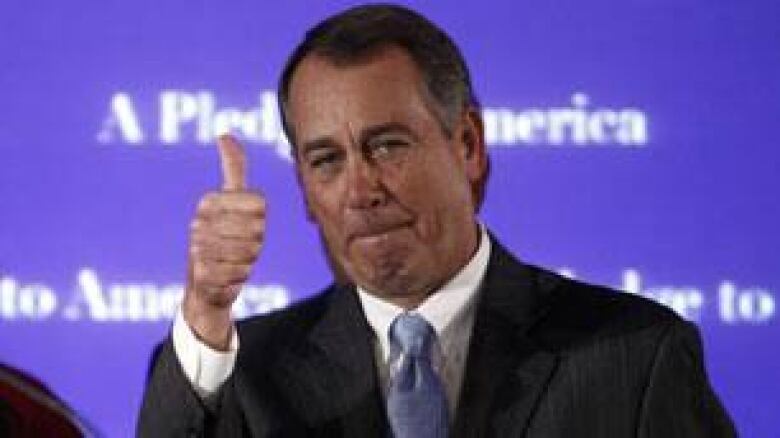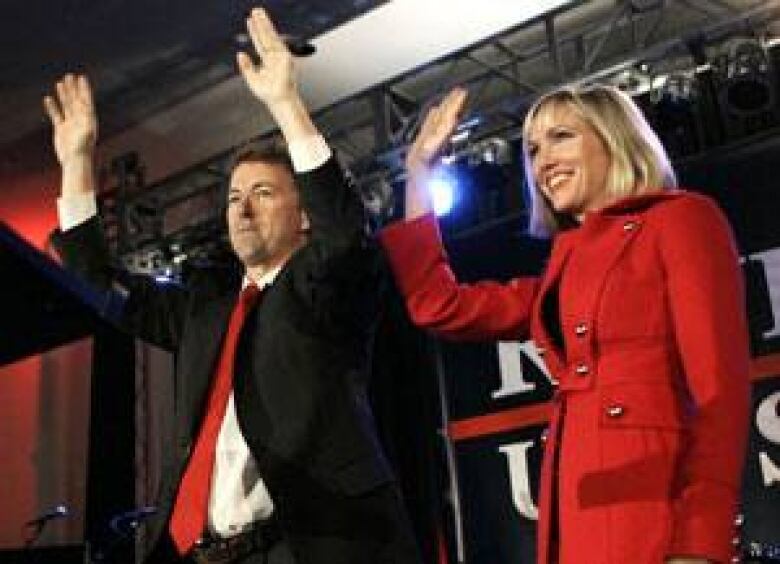Republicans take U.S. House, Dems hold Senate
The Republicans have won control of the U.S. House of Representatives in midterm elections,but theDemocratswill keep their Senate majority, according to projections by several U.S. media outlets.
Republicans picked up at least sixSenate seats, includingwins in Pennsylvania, Arkansas, Indiana,North Dakota andthe defeat ofthree-term Democratic SenatorRuss Feingold in Wisconsin. In an embarrassmentfor the Democracts, RepublicanMark Kirk won the Illinois Senate seat formerly held by U.S. President Barack Obama.
However, Democratic Senate victories inNevada, Connecticut, West Virginia and California prevented the Republicansfrom gaining the10 seats they needed tocapture the upper chamber.
In Nevada, DemocratHarry Reid, the Senate Majority Leader,survived a fierce challengefrom Tea Party-backed Republican Sharron Angle.
The Republicanssnatched away at least 56House seats from the Democrats, many more than the39 the party neededto take control of the House. Democrats managed towrest only two House seats from Republican control. The swing in the House was the biggest in 70 years, toppingthe Republicanlandslide of 1994.
The conservative tide swept aside Democratic freshmen and longtime veterans alike. Democratic losses includedtwo powerful politicians: 14-term South Carolina Rep. John Spratt, the head of the Housebudget committee, and Missouri Rep. Ike Skelton, the House armed services committee chairman, who hadmore than 30 years' experience.
The Housetriumph will mean the current Republican minority leader, John Boehner of Ohio, will likely replace Democrat Nancy Pelosi as Speaker of the House.

"With their voices, the American people are demanding a new way forward in Washington. I'm here to tell you tonight that our new majority will be prepared to do things differently," Boehner said.
He said that approach starts with cutting spending, reducing the size of government and reforming the way Congress works.
The Republicans'gains could alsoderail Obama's agenda in the last two years of his term, potentially leaving Washington in a political gridlock unless Obama can find common ground with some of his fiercest critics.
"While our new majority will serve as your voice in the people's house, we must remember it's the president who sets the agenda for our government," Boehner said. "The American people have sent an unmistakeable message to him tonight, and that message is 'change course.' "
Obama called Boehner later in the night to offer his congratulations and to say he wanted to find "common ground" with Republican leaders.
EBay ex-CEO loses Calif. governor race
Republicanshave also picked up at least 10 governorshipsand were expected to win the majority of the 37 races being contested. Democratic loses included Pennsylvania, Ohio, Michigan, Wisconsin, Iowa, Tennessee, Kansas, Oklahoma, New Mexico and Wyoming.
But Republican candidate and former eBay CEO Meg Whitman, who poured more than $150 million of her own money into her campaign tosucceed Arnold Schwarzenegger as Californiagovernor,went down indefeat toformer governor Jerry Brown.
The Democrats hung on to governorships in New York, Massachusetts, Maryland, New Hampshire, Arkansas and Colorado.
Candidates backed by the Tea Party movement recordedsome early wins Tuesday evening.
Rand Paul, son of Texas Rep. Ron Paul, defeated Democratic rival Jack Conway in the race forKentucky's open U.S. Senate seat.
"I have a message from the people of Kentucky, a message that is loud and clear and does not mince words," Rand told his supporters. Weve come to take our government back!"
ELECTION PRIMER
What's at stakein Tuesday's vote
Republican Marco Rubio in Florida also coasted to an easy Senate victory. Rubio defeated Democratic challengerKendrick Meek and Charlie Crist, the formerRepublican governor of the state, who lost the primary challenge to Rubio and decided to run as an Independent.
But Republican Christine O'Donnell, who gained national attention for saying she had previously dabbled in witchcraft, lost the Senate contest in Delaware toDemocrat Chris Coons. Some Republicanshad slammedO'Donnell's nominationin the primaries, saying they had a better chance of picking upthe seat had they chosen MikeCastle, a moderate Republican.

Voters decided on all 435 seats in the House of Representatives as well as 37 of the 100 Senate seats, as well as the 37 governor races.
Leading up to Tuesday's vote, opinion polls suggested a Republican takeover of the Housewas all but assured.
ARepublicansweep would have beena political reversal of fortune for the party, which lost complete control in Washington following the election of U.S President Barack Obama.

Since then, Americans have become increasingly frustrated with the economy and unemployment. Obama's historic legislative achievements in health care and the stimulus package have also met with controversy over concerns about spending.
Exit polls confirmed that four in 10 voters said they were worse off financially than two years ago, more than one in three said their votes were an expression of opposition to Obama, but more than half expressed negative views about both political parties.
Roughly 40 per cent of voters considered themselves supporters of the conservative Tea Party movement. By contrast, about three in four expressed negative views about the federal government. Less than half said they wanted the government to do more to solve problems.
Government spending in particularhas givenrise to the Tea Party movement, which has campaigned on spending cuts and lower taxes and has boosted enthusiasm among the Republican ranks.
Nearly three dozen Tea Party-backed Republicans were in competitive races Tuesday. Democrats were hoping that the ultraconservative policies of many ofthose candidates will prove too extreme for voters in the general election.
The Centre for Responsive Politics estimates that $4 billion has been spent on U.S. election campaigns this year by candidates, political parties and outside special interest groups, far exceeding the $2.85 billion spent during the last midterm election year, in2006.
Voters in several states are alsodecidingon a range of ballot measures, including a California proposal on the legalization of small amounts of marijuana.
With files from The Associated Press












_(720p).jpg)


 OFFICIAL HD MUSIC VIDEO.jpg)
.jpg)



























































































